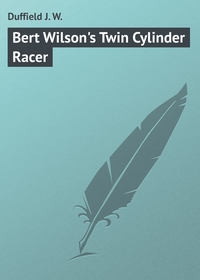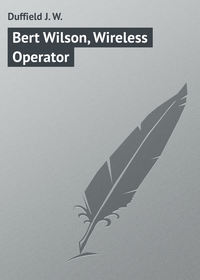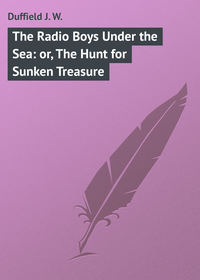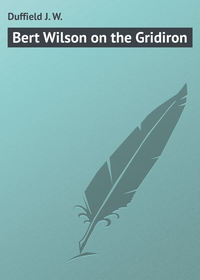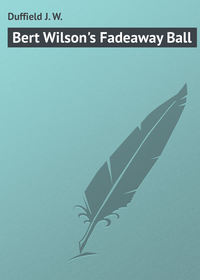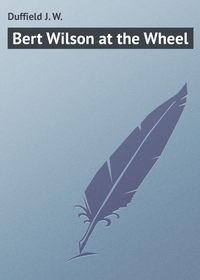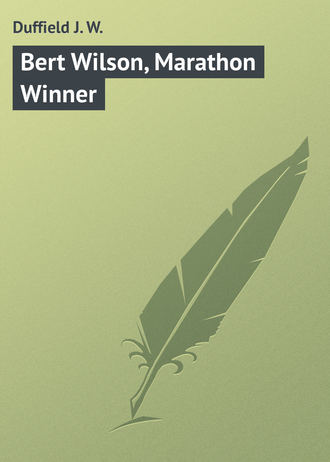 полная версия
полная версияBert Wilson, Marathon Winner
Bert needed no urging and rushed back to his rooms with the good news that made his friends jubilant.
“Hustle’s the word from now on,” cried Tom. “Let’s get our things together in a hurry.”
And they hustled to such good purpose that within an hour their traps and outing togs were thrown into the capacious tonneau of the Red Scout and they piled in ready for the start.
Bert’s fingers thrilled as he grasped the wheel and threw in the clutch. The noble car almost seemed to recognize its driver and flew along like a thing alive. The roofs and towers of the college buildings faded away behind them and their journey to the Adirondacks was begun.
The roads were fine and the weather superb, and they figured that if these conditions held out they would reach their destination the afternoon of the following day. An ordinary car with a mediocre driver could not have made it. But the Red Scout had long before demonstrated its speed, and under Bert’s skilful handling it fairly ate up the miles that intervened between them and their journey’s end. Of course they had to slow up a little when they passed through towns, but when the road stretched far ahead like a white ribbon with no other vehicle in sight, Bert let her out to the limit. If the speed laws weren’t exactly broken, they were at least in Tom’s phrase “slightly bent.” Occasionally Tom and Dick relieved him while he leaned back in the tonneau and talked with Mr. Hollis.
At railroad crossings they were perhaps unduly careful, for all remembered that awful moment when they had been caught on the tracks and only Bert’s lightning calculation had saved them from a frightful disaster.
“Will you ever forget,” asked Tom, “how the old Scout bumped over the ties at the rate of a mile a minute while the express train came roaring up behind us?”
“Never,” replied Dick. “More than once I’ve dreamed of it and lived it all over again until I woke in a cold perspiration. Once it actually seemed to strike and throw me up in the air, and when I landed I almost jumped out of bed. It gives me the creeps just to think of it, and I don’t want anything more of that kind in mine.”
“It sure was a case of touch and go,” chimed in Bert. “I could feel the heat from the engine on my neck as I bent over the wheel. Of course we knew that the engineer was working desperately to stop, but the question was whether he could do it in time. If anything had given way in the Scout, it would have been all up with us.”
“But she pulled us through all right,” said Dick, patting the side of the car, “like that famous horse on his way to the battlefield:
‘As though it knew the terrible need,It stretched away at its utmost speed.’But we can’t gamble that way with death more than once and hope to ‘put it over,’ and after this I don’t need to have any railroad sign tell me to ‘Stop. Look. Listen.’ I’ll do all three.”
With chat and song and laughter the hours sped by. They were young, life ran warm in their veins, the world lay before them full of promise and of hope, glowing with all the colors of the rainbow. A happier, more carefree group it would have been hard to find in all the broad spaces between the Atlantic and the Pacific. Had any one told them of the awful hazard, the haunting fear, the straining horror that they were soon to undergo they would have laughed at him as a false prophet of evil. The present at least was theirs and they found it good.
At about two o’clock in the afternoon they reached the county town, and here they reluctantly said good-bye for the present to the Red Scout. The one road through the wilderness up to Mr. Hollis’ house was a rough path to be trodden only on foot or, at need, in one of the mountain buckboards that could bump its way along over spots and around stumps that might have wrecked a machine. So after arranging for the care of the auto, they shouldered their few bundles and set out on foot. It was an ideal day for walking. The sun scarcely made itself felt as it filtered through the trees, and the balsam of the woods was like a tonic. Long before dusk they reached the lodge where a good supper awaited them, prepared by the caretaker whom Mr. Hollis had notified of his coming.
The night came on clear and almost cold in that high mountain altitude and it was hard to realize that men were sweltering in cities not far away.
“We’ll sleep under blankets to-night,” said Mr. Hollis, “and in the meantime what do you say to building a roaring camp fire right out here in the open? It’ll be a reminder of the old days in camp when Dave Ferris used to spin his famous ghost and tiger yarns.”
The boys hailed the suggestion with enthusiasm. They speedily gathered a supply of dry branches, enough to replenish the fire the whole evening. Then while the flames crackled and mounted high in the air they threw themselves around it in all sorts of careless attitudes and gave themselves up to unrestrained enjoyment of the time and place. At last slumber beckoned and they turned in.
They slept that night the dreamless sleep of health and youth and woke refreshed the next morning ready, as Tom put it, “for anything from pitch and toss to manslaughter.” A plunge in a nearby stream whetted their appetites for the hearty breakfast that followed, and then they went out for a stroll, while Mr. Hollis remained in the lodge, discussing with the caretaker the approaching visit of his family.
It was a glorious morning. The dew still sparkled on the grass, birds sang in the trees, and the newly risen sun flooded the landscape with beauty. A mountain brook rippled over the stones. Partridges drummed in the tangled thickets, chipmunks flitted like shadows across the mountain paths, squirrels chattered noisily in the branches. Everywhere was life and movement, but all the artificial noises of the town were conspicuous by their absence. To the boys, so long used to city life, the change was delightful beyond words.
By the side of the path, about a quarter of a mile from the lodge, was a great dogwood tree snowy with its fragrant blooms. Tom reached up to break off a branch, but just as he snapped the stem it slipped through his fingers and fell in the bushes beneath. He stooped over to pick it up. There was a whirring sound, a rattle that struck terror to their hearts and Tom jumped back with a great, gray, writhing thing hanging to his sleeve. He shook it off and staggered backward, while the rattler instantly coiled to strike again.
CHAPTER III
A Run for Life
Quick as lightning Bert slashed at the wicked head with a heavy stick he had been carrying. It caught the snake just as it darted forward and broke its back. It fell, twisting and writhing, and Bert throwing away his stick leaped to Tom’s side.
“Did he get you, Tom?” he asked, with a horrible fear tugging at his heart.
“I don’t know,” answered Tom, trying to smile. “He seemed to be tangled up in my sleeve. Perhaps his teeth didn’t go through. But I feel – rather – queer.”
In an instant Dick and Bert yanked off Tom’s coat and rolled up his shirt sleeve. Their hearts almost stopped beating. There, just below the elbow were two tiny punctures, fiery red against the white skin.
Like a flash Dick’s lips were on the wound as he strove to draw out the venom. Bert whipped out his handkerchief and tied it tightly just above those ominous spots. Then he thrust a stick through the folds and twisted it until Tom grew white with the pain.
Drawing his whistle from his pocket, Bert blew loud and shrill a series of short and long notes in the Morse alphabet that told of deadly need and peril. He knew that if it reached the ears of Mr. Hollis it would bring him instantly.
And now for a doctor. But where? He cast wildly about him and his heart sank as he realized that there was none nearer than the county town fourteen miles away. Fourteen long miles over a rough forest road. There was no telephone or telegraph in that wilderness. The only horse on the place was a sedate old brute who couldn’t be flogged into a gallop. There was one thing to do and only one. He leaped to his feet.
At that moment an answering whistle came over the hill, telling him that Mr. Hollis had heard and was coming.
“I’m off,” Bert cried to Dick. “Keep a stiff upper lip, old man,” as he clapped Tom on the shoulder. Another moment and the woods closed round him.
Those giant trees, centuries old, had seen some strange sights in their time. Perhaps in the old days some Indian brave in pursuit of his quarry or himself pressed hard by enemies had passed beneath them like the flight of an arrow. But it is doubtful if they had ever seen a white man running at such speed as Bert’s, as like a young Mercury with winged heels he rushed along under their branches. Life was at stake – Tom’s life, he reflected as a pang tore through him – and he must run as he had never run before if he were to come out winner.
The road itself was a fearful handicap. It was little more than a woodcutter’s path, ridged by deep furrows, dotted here and there with stumps, strewn with branches blown down in storms. Even where it was comparatively clear, the pine needles that carpeted it in spots offered a slippery and treacherous footing. Low-hanging branches brushed his face, long creepers reached out to grasp his flying feet. If he should once slip or trip or sprain an ankle – . He shuddered and ran on.
He had started off at a terrific pace and had covered three miles or more at top speed. Then the strain began to tell. His lungs were laboring and his breath came in gasps that were almost sobs. He took a grip on himself. At this rate he would collapse before he had gone five miles. He must husband his strength or he would never reach the end of his journey. And then – .
At the thought he slackened speed and fell into the long steady lope that yet covered the ground at an amazing rate. His breathing became easier and he knew that he would soon get his second wind. Then he felt that he could run all day.
Now he had made half the distance and from the crown of a hill he caught sight of the far-off spire of a church that marked the location of the town. It put new speed into his feet and life into his veins. He would win through. He must win through. Yet through his self assurance came at times the terrible thought – suppose that after all he should be too late.
A fierce rage against the whole snake family took possession of him. Again he heard the blood-curdling rattle; again he saw the malicious eyes in which a devil lurked, the ugly triangular head, the long slimy diamond-marked body that turned him sick with loathing. He could have wished that all the venomous tribe had been compressed in one, that he might kill it with a single blow.
But he shook off this feeling. Hate weakened him – taxed too heavily his vital forces. He must concentrate on just one thing – Tom and the terrible need for haste.
Now he was running easily. His wind was in good condition. His legs had taken on new strength. The only danger left was the path. If he could avoid injury that would cripple him, he knew he could win. He had shed hat and coat and vest, had even thrown away his knife and whistle to lighten himself by every ounce for the final sprint. A mountain brook lay in his path. He stooped, dashed the water over his head and ran on.
At last the woods became less dense. Scattered clearings here and there told him he was reaching the outskirts of the town. He passed a farmhouse, then another. He caught a glimpse of people at doors and windows staring at him as though at an apparition. A team drew hastily aside to let him pass. A straggling line of houses marked the entrance to the town. Just as he reached the main street, he caught sight of a doctor’s sign, and dashing upon the porch hammered at the door.
The woman who opened it started back at the sight of him. He was dripping with sweat, his face was haggard and drawn, his eyes burning with excitement.
“The doctor,” he gasped.
“Here he is,” said a tall, keen-faced man, appearing at this moment. “What is it?”
Between gasps Bert made known his errand. The doctor’s face grew grave.
“Sit down,” he said, “and I’ll harness up and be with you in a minute.” And he hurriedly left the room.
But Bert was thinking quickly. Over that rough road and largely uphill, even a good horse – and the doctor’s nag was not likely to be a thoroughbred – would find it hard to negotiate the distance within two hours. And what might happen to Tom in that time he did not dare to think. What could he do? And then like a flash came the solution. The Red Scout! She could make it in twenty minutes.
Without a word he rushed out of the house and across to the combination livery and garage where the machine was stored. There it stood, the most conspicuous object in the place, with all trace of its journey removed and its cylinders shining. It was the work of a moment to explain matters to the proprietor and see that there was plenty of gasoline in the tank. He sprang to the driver’s seat, threw in the clutch and glided swiftly out to the road. So that when the doctor drove around the side of the house he was astonished to see the great car come swooping down upon him.
“All ready, doctor,” shouted the wild-eyed youth at the wheel, “come along.”
“You’ll never make it,” he protested, “on this road. You’ll split it apart. You’ll tear it to pieces.”
“We will make it,” cried Bert. “We must make it. Jump in.”
For a moment the doctor hesitated. He knew – none better – the need of haste. Still his own life was precious. Then he rose to the occasion. His sporting blood was roused. He would take a chance. He swung his case into the tonneau and leaped in after it. “Let her go,” he called.
And Bert let her go!
The doctor saw some “demon driving” that day. The great machine sprang forward like an arrow released from the string. The cheer that rose from the little knot of townspeople who had hastily collected was lost in the roar of the exhaust. The town itself melted away like a dream. The wind whistled past them with a shriek. In a moment they had passed the straggling farmhouses and entered on the road that led upwards through the woods.
Crouched low over the wheel to offer as little resistance as possible to the wind, Bert kept his eye glued on the path ahead. To strike a tree meant death. Collision with a stump would be wreck and disaster. The car lunged from side to side and the doctor, down on the floor of the tonneau, held on for his life. Again and again they grazed death by a hair’s-breadth and escaped as by a miracle. Yielding to Bert’s slightest touch, the Scout evaded a stump here, a gully there, part of the time on two wheels, again on three, but always righting in time. And all the while, it was climbing, climbing – .
Now they had covered three-fourths of the distance and his heart leaped in a wild riot of exultation. He patted the wheel, soothed it, talked to it as though it could understand.
“Go it, old scout,” he muttered, “keep it up. We’ll get there yet. We’re running for Tom. You know Tom, good old Tom. You’ve carried him many a time. Now perhaps he’s dying. Hurry, hurry, hurry.”
His own fierce energy seemed to impart itself to the car. On it went until it topped the rise of the clearing, swung into the road that led to the lodge, and with a triumphal blast from its horn tore up to the door. Before it had fairly stopped, Bert leaped from his seat and the doctor stepped down from the tonneau, his face set and drawn from the perilous ride.
“Thank God, you’ve come,” cried Mr. Hollis appearing at the door. “I didn’t dare to hope for you for two hours yet. Come in, quick.”
There was no time for further explanations, but in the course of the fight for Tom’s life that followed, Bert learned of what had happened since he had started on his run for help. Warned by the whistle, Mr. Hollis and the caretaker had hurried to Dick’s side, and together they had carried Tom to the house. They had kept the ligature tight and had cut out the part immediately surrounding the wound. By the greatest efforts they had fought off the deadly coma, but, despite it all, he was fast lapsing into unconsciousness when the doctor appeared.
Faced by a peril that he knew, the doctor pulled himself together and became the cool, alert man of science. Such cases were familiar to him in that wild district, and there was no hesitation or uncertainty in his treatment. His quick sharp commands found ready obedience from his willing helpers, and after an hour of the hardest kind of work the fight was won. Tom’s pulse became more normal, his brow grew moist and he opened his eyes and smiled faintly at the group around him. The doctor rose.
“He’ll be all right now,” he said. “The fangs just missed the large vein, or he’d have been done for. As it is, we’ve barely pulled him through. If we’d been an hour later, I wouldn’t have answered for him. We can thank this young man,” looking at Bert, “for saving his friend’s life. By George, such driving! I’ve never ridden so fast before and I never want to again. A little more of that and I’d be a candidate myself for the hospital or insane asylum. How we escaped being dashed to pieces I don’t know.”
“It was great luck,” said Bert.
“It was great skill,” ejaculated Dick.
“It was Providence,” said Mr. Hollis gravely, and no one cared to dispute him.
After Tom was sleeping naturally and healthfully, and Bert and the doctor had bathed and dressed, they sat down to dinner. It was a quiet meal as all were feeling the reaction from the tremendous efforts of the morning. But their fatigue was lost in thankfulness. They had matched their forces against death and this time had won. But by how narrow a margin!
Dinner over, they strolled down the path to the scene of the encounter. There lay the cause of all the trouble. The long body, as thick as a man’s wrist, stretched out in a wavy line across the road. The diamond markings had dulled somewhat, but the staring eyes still seemed lit with malice.
“What a holy terror!” exclaimed Dick.
“Yes,” said the doctor. “He’s an old-timer, sure enough. He must be over five feet long and eleven years old, as you can see from his rattles. If you don’t mind, I’ll take these rattles along and hang them up in my office. They’ll serve to remind me of the most stirring incident in my life so far,” and he smiled, mischievously, at Bert.
“Take them and welcome as far as I’m concerned,” said Bert. “For my part I never want to see another snake, living or dead, for the rest of my natural life.” And as every one else felt the same way, the doctor neatly severed the grisly memento, to be duly dried and mounted in his sanctum.
Bert offered to take the doctor back to town in the auto, but the others put in an emphatic veto.
“No, you don’t,” said Mr. Hollis. “Not another thing for you to-day but rest.”
“You bet there isn’t,” echoed Dick. “Even Reddy, tyrant that he is, would agree that you’d had exercise enough for one day. I’ll take the doctor down myself. He won’t go back as fast as he came up, but he’ll be more comfortable. I always look out for the safety of my passengers,” he added, with mock severity.
The doctor grinned appreciatively. “Slow down to a walk as far as I’m concerned,” he said. “My appetite for speed has been satisfied for a long time to come. Any more just now would give me indigestion.”
Dick’s plan was to put the Red Scout in the garage, stay at the hotel that night and walk back in the morning. But the doctor who had taken a great liking to these young specimens of manhood overruled this, and insisted so strongly that Dick should be his guest over night that this was finally agreed upon.
“I’ll bring you back in the buckboard,” he said, “when I come up to-morrow to see how our patient is getting along. In the meantime, don’t worry. The worst is over and it’s only a matter of careful nursing for the next few days and he’ll be on his feet again. His youth and vitality and clean life, together with the ‘first aid’ you gave him have pulled him through.”
“Not to mention the doctor and Bert and the ‘Red Scout,’” added Mr. Hollis.
The doctor laughed and stepped into the machine. Dick took the wheel and the splendid car, none the worse for its wild ride, started on its way back to town, while Bert and Mr. Hollis, standing on the porch, looked after it almost as affectionately as though it had been human.
“Tally one more for the good old Scout,” murmured Bert, as he turned away.
That evening, his face still flushed at the heartfelt praise of his host, Bert went in to bid Tom good-night. The patient was getting on famously, but the shock to his system still persisted and he had been forbidden to do much talking. But the pressure of his hand on Bert’s and the look in his eyes were eloquent.
“Do you remember, Bert,” he half whispered, “what Reddy said the last time you saw him?”
“Why, no,” answered Bert, puzzled, and cudgeling his memory, “nothing special. What did he say?”
Tom smiled. “You’re fit to run for a man’s life.”
CHAPTER IV
A Desperate Struggle
Tom mended fast, though not in time to go back with Bert and Dick, and Mr. Hollis insisted that he should stay a week or ten days longer at the lodge until he had fully recovered.
The precious week of vacation passed only too quickly, and promptly on the day that college resumed, Bert, faithful to his promise, was back at work. He had carefully kept up his practice, and this, combined with the invigorating mountain air, had put him in splendid shape. As he confided to Dick, “if he’d felt any better he’d have been afraid of himself.” So that when he reported to Reddy and submitted to his inspection, even that austere critic could find no fault with the sinewy athlete who smilingly extended his hand.
“By the powers,” he said, as he looked him up and down approvingly, “I did a good thing to let you go. You’re fine as silk and trained to the hour. If looks count for anything you could go in now and break the record. Get out on the cinder path and let me time you for a five-mile spin.”
With the eye of a lynx, he noted Bert’s action as he circled the track. Nothing escaped him. The erect carriage, the arms held close to his sides, the hip and knee movement, the feet scarcely lifted from the ground, the long, easy stride that fairly ate up space, the dilated nostrils through which he breathed while keeping the mouth firmly closed, the broad chest that rose and fell with no sign of strain or labor – above all, the sense of reserve power that told of resources held back until the supreme moment called for them – all these marks of the born runner the trainer noted with keen satisfaction; and he was chuckling to himself when he snapped shut his split-second watch and thrust it in his pocket.
“He’ll have to break a leg to lose,” he gloated. “That lad is in a class by himself. I’m none too sure of the other events, but we sure have this one cinched. We’ll win in a walk.”
But while he thus communed with himself, he carefully abstained from saying as much to Bert. He had seen too many promising athletes ruined by overconfidence. Besides, while he felt sure that Bert could take the measure of any one now known to him as a runner, he couldn’t tell but what some “dark horse” would be uncovered at the general meet who would bring all his hopes tumbling about his head like a house of cards. Too many “good things” had gone wrong in his experience not to make him cautious. So it was with well-simulated indifference that he held up his hand at the end of the fifth mile.
“That’s enough for to-day,” he commanded. “To-morrow we’ll start in with the real work. We only have a scant two weeks left before the New York meet and we’ll need every minute of it.”
And Bert bent himself to his task with such earnestness and good will that when at last the great day of the final meet arrived he was at the top of his form. Neither he nor Reddy would have any excuses to offer or anything to reproach themselves with, if he failed to show his heels to the field.
And, as Dick remarked, when they entered the gate of the mammoth park, it “was certainly some field.” From every section of the country they had gathered – burly giants from the Pacific slope, the slenderer greyhound type of the East – some from colleges, others wearing the badge of famous athletic clubs – all of them in superb condition and all passionately bent on winning. To carry off a trophy in such company was a distinction to be prized. And, in addition to the ordinary incentives, was the international character of the event. Before the eyes of each hung the lure of a European trip and the opportunity of proving on foreign fields that the picked athletes of America could lead the world. Patriotism was blended with personal ambition and they formed a powerful combination.


